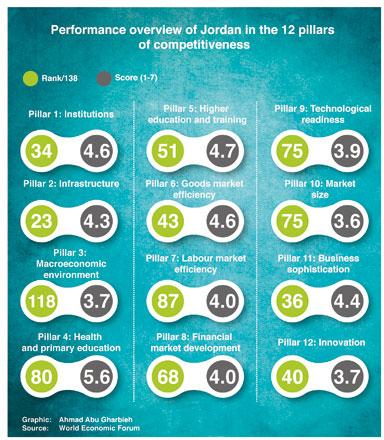You are here
Jordan ranks 65th in global competitiveness report, 7th in region
By Camille Dupire - Sep 28,2017 - Last updated at Sep 28,2017
AMMAN — Maintining its overall score, Jordan slipped two ranks globally, falling to the 65th place out of 137 in the Global Competititveness Report 2017-2018, published Tuesday by the World Economic Forum (WEF).
The Kingdom seized the 7th place in the region, preceded by the UAE, Qatar, Saudi Arabia, Bahrain, Kuwait and Oman.
“The country continues to benefit from a fairly stable and efficient institutional system and relatively good infrastructure, innovation and business sophistication,” the report stated.
Attributing this stability to the recent governmental measures to consolidate the country’s fiscal situation and business environment, the report highlighted the numerous challenges posed by the large refugee influx over the recent years.
With stranded resources and increased scrutiny of public spending by the private sector and the public at large, the Kingdom has been forced to increase taxation, which was considered as the “most problematic factor for doing business”, the report showed.
Access to financing, policy instability, inefficient national bureaucracy and inadequately educated workforce were also cited as major hinderances to the national business environment.
Defining competitiveness as “the set of institutions, policies and factors that determine the level of productivity of a country”, the report is based on a global competititvness index that encompasses 12 pillars covering wide-ranging aspects of the economy.
The Global Competitiveness Report is an annual evaluation of the factors driving countries’ productivity and prosperity, including institutions, infrastructure, macroeconomic environment, health and primary education, higher education and training, goods market efficiency, labour market efficiency, financial market development, technological readiness, market size, business sophistication, and innovation.
Jordan displayed some encouraging progress in the innovation and sophistication factors, ranking 46th and 48th globally in the respective categories, the report showed.
The Kingdom’s overall score was however brought down by its very poor performance in the 3rd pillar — macroeconomic environment — ranking 115 out of 137 countries worldwide, a low average even compared to its regional counterparts.
For economist Zayyan Zawaneh, this overall retreat can be attributed to two main reasons: Jordan’s quality of education and manpower that drastically dropped over the last 20 years, and its internal economic policies.
“It is not only the external factors which are to blamed for this retreat,” he told The Jordan Times on Thursday, noting “Jordan’s internal policies have failed to attract investments even prior to those regional conflicts...”
Citing the example of the industrial sector, the economist blamed the high costs of production on high taxation, hikes in water and electricity prices, among others, for the unattractive macroeconomic environment.
“We can expect Jordan to keep retreating in the future if our policies are not changed to reverse the situation. While the Kingdom keeps dropping, other countries are advancing more and more,” he stated.
For his part, former deputy prime minister and economist, Jawad Anani, called for a renegotiation of the standing agreement with the International Monetary Fund, which did not achieve the projected growth in the Kingdom’s indicators.
“The government has exerted tremendous efforts to rectify the issues of public debt, inflation and balance of trade in recent years. But the increase in taxes and the measures required by the IMF have put Jordan on the downwards slide of the curb,” the economist told The Jordan Times.
Regionally, the Middle East and North Africa region indeed improved its average performance, despite further deterioration in some countries’ macroeconomic environment due to regional turmoil, according to the report.
Despite a still low level in oil and gas prices, the United Arab Emirates asserted its economic position as a regional leader, ranking 17th globally, followed by Qatar (25th), and Saudi Arabia (30).
The report attributed these improvements to efforts these countries exerted to boost diversification and increase investments in digital and technological infrastructure that have ultimately contributed to major improvements in technological readiness.
“Countries must establish an environment that enables citizens and businesses to create, develop and implement new ideas that will allow them to progress and grow,” Xavier Sala-i-Martin, professor of economics at Columbia University, was quoted in the report as saying.
“The Global Competitiveness Report helps us understand the drivers of innovation and growth and this edition comes at a time when increasing the ability of countries to adopt innovations is critical to achieving broad-based growth and economic progress,” he added.
Ten years after the global financial crisis of 2007, economies remain at risk from further shock and are ill-prepared for the next wave of innovation and automation, after the report found.
Switzerland maintained its rank as the world’s most competitive economy for the ninth consecutive year, followed by the United States and Singapore. Sub-Saharan Africa countries came at the bottom of the list, with conflict-engulfed Yemen remaining in the last position with little to no competitivity.
Globally, the report highlighted three areas of the greatest concern: the financial system, where levels of “soundness” have yet to recover from the shock of 2007, the importance of work flexibility, and the imbalance between investments in technology and efforts to promote its adoption throughout the wider economy, which seem to be the reason innovation often fails to ignite productivity.
“Global competitiveness will be more and more defined by the innovative capacity of a country,”said Klaus Schwab, WEF Founder and Executive Chairman, concluding “talents will become increasingly more important than capital and therefore the world is moving from the age of capitalism into the age of talentism.”
Related Articles
AMMAN – Jordan's competitiveness ranking worldwide and regionally improved on the World Economic Forum’s (WEF) Global Competitiveness Index
AMMAN — Jordan ranked 7th most competitive Arab country in the latest economic index, scoring as high as 25th globally on availability of en
Jordan’s ranking dropped by three places to 64th in the Global Innovation Index (GII) 2014, which outlines the world’s most innovative economies, covering 143 countries.

















